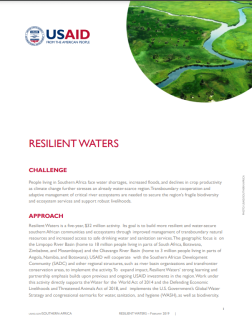CHALLENGE
People living in Southern Africa face water shortages, increased floods, and declines in crop productivity as climate change further stresses an already water-scarce region. Transboundary cooperation and adaptive management of critical river ecosystems are needed to secure the region’s fragile biodiversity and ecosystem services and support robust livelihoods.
APPROACH
Resilient Waters is a five-year, $32 million activity. Its goal is to build more resilient and water-secure southern African communities and ecosystems through improved management of transboundary natural resources and increased access to safe drinking water and sanitation services. The geographic focus is on the Limpopo River Basin (home to 18 million people living in parts of South Africa, Botswana, Zimbabwe, and Mozambique) and the Okavango River Basin (home to 3 million people living in parts of Angola, Namibia, and Botswana). USAID will cooperate with the Southern African Development Community (SADC) and other regional structures, such as river basin organizations and transfrontier conservation areas, to implement the activity. To expand impact, Resilient Waters’ strong learning and partnership emphasis builds upon previous and ongoing USAID investments in the region. Work under this activity directly supports the Water for the World Act of 2014 and the Defending Economic Livelihoods and Threatened Animals Act of 2018, and implements the U.S. Government’s Global Water Strategy and congressional earmarks for water, sanitation, and hygiene (WASH), as well as biodiversity.
OBJECTIVES
- Improve transboundary water security and resource management.
- Increase access to safe, sustainable drinking water and sanitation services.
- Strengthen the ability of communities and key institutions to adapt to change, particularly the impacts of climate change.
- Conserve biodiversity and ecosystem services.
RESULTS
- Strengthened institutional arrangements at various scales.
- Increased access to safe, affordable, appropriate drinking water supply and sanitation services, including improved conditions for WASH investments.
- Enhanced decision-making capacity, grounded in science, to respond to climate risks.
- Improved management practices that mitigate threats to biodiversity and improve ecological integrity.
CONTACT
Olanda Bata
Resilient Waters, Chief of Party
mobata@resilientwaters.com
+27 12 943 1339
Graham Paul
gpaul@usaid.gov
+27 12 452 2252

